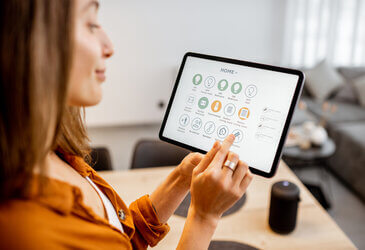Impact of IoT on Smart Metering

The Internet of Things (IoT) is promising to make the environment smarter and connected – from home to cities and offices. Connected devices are adopting IoT at a rapid pace. One of the leading firms, Gartner, revealed that around 8.4 billion devices were in use in 2017, 31% up from 2016 and it will reach about 20.4 billion by 2020.
Since IoT is expanding continuously, the need for connectivity methods grows to ensure that the devices work, capture, analyze, and manage the data accurately. That’s why connectivity should be flexible to meet the network performance needed for a wide range of IoT use cases, device types, and applications.
Almost in every industry, connectivity has enabled the development of new technologies and changed how cities are embracing big data.
Utilities have always been at the forefront of the IoT, where smart metering plays a significant role. Smart metering has provided utility product manufacturers with a suitable way for flexible, reliable and secure connectivity solutions.
The report conducted by ABI Research, says that around 700 million smart meters were installed in 2018 and this number will be doubled to reach about 1.34 billion by 2023.
We shall cover the following content in the article:
- What is Smart Metering?
- How does IoT-enabled Smart Meter work?
- What are the benefits of Smart Metering?
- What are the use cases of Smart Meter?
What Is Smart Metering?
Smart Metering is a technique of digitizing the energy system using smart meters that provides businesses a way to track how much energy they are using so that they can adjust the usage when required.
A Smart Meter is an intelligent digital device that is designed to replace the traditional electricity and gas meter. It can be equipped with a display screen that shows the exact energy usage in real-time. Installing a smart meter helps you get rid of estimated bills by allowing you to control and reduce energy consumption.
It comes with the functionality that allows sending meter readings to energy suppliers and gathering information remotely. Smart cities can leverage smart meters to collect data that provides insights on infrastructure, public services, and population.
The typical challenge for companies implementing smart meters is how to integrate them within their infrastructure and organize custom smart metering use cases. Here is when IoT comes into the picture.
The best way to integrate smart meters within its infrastructure is by using an IoT platform that comes with data processing capabilities. It will not only allow you to collect data from smart meters but can also help you set up custom visualization dashboards.
How does IoT-enabled Smart Meter work?
A smart meter works, depending on its functionality, whether it is used for measuring electricity or gas. IoT-enabled smart meter uses features of embedded systems, i.e., a combination of software or hardware.
To install a smart meter, there is no need to replace the existing energy meter. Instead, a small modification is done on the already installed meters to convert them into smart meters.
We shall explain the working of a smart meter that uses the ESP8266 Wi-Fi module and Arduino that cannot only send you the notification but also monitor energy uses. ACS712 current sensor can be used to measure energy consumption.
Following are some of the components that can be used in the working of a smart meter:
- Arduino UNO
- ACS712-30 Amp Current Sensor
- ESP12/NodeMCU
- Male-Female Wires
ACS712 sensor works on the principle of Hall-effect and is used to measure the magnetic field around a conductor carrying current. It can measure both DC and AC and provides the separation between the measuring unit and the load.
Arduino can read the current sensor value via analog pin and transfer it to the Wi-Fi module with serial communication. MQTT broker can be used to monitor energy uses over the internet.
The smart meter reading is generated 24*7 in real-time and is sent to the edge of the network where edge computing can be applied to implement business logic for the data captured by a meter. For example, the cost of electricity can be calculated in real-time.
Consumers can set a threshold value for electricity units. Logic can be implemented to turn off the meter automatically if it crosses the threshold amount set by the consumer. If a user increases the threshold value, the meter can automatically turn on. Therefore, smart meters can also be used for the better conservation of electricity.
What are the benefits of Smart Metering?
Smart Meters provide you an understanding of how you utilize the energy. Smart meters come with an in-house display that lets you track energy when you are using devices. It helps you see in real-time if the changes you have made for better energy consumption is really working or not.
Here are some of the benefits of Smart Meters:
- Convenience
Unlike the manual process, the electricity department won’t require a representative who goes to every home or building to take readings and generate the bill. Using Smart Meters, readings can be automatically sent to the electricity department. No one needs to fumble around in the darkness to get to gas or energy meters. - Accuracy
You won’t receive estimated bills anymore with smart meters because usage figures are directly sent to the electricity department in real-time. The traditional way of energy billing requires a higher degree of guesswork. Also, there’s no room for human error as the intelligence of IoT is implemented in generating energy bills. - Control over energy consumption
Smart meters come with a smart energy display that allows you to see how much energy generated by your appliances cost you in pounds and pence. It helps you track the actual cost of your bill before even it is generated. You can also identify when you use the least or most energy. Smart Meters can help you find new ways to save money by switching to energy-saving appliances. - Safety from faulty appliances
Since in-home displays equipped with a smart meter can show you how much energy is being used at a specific time, you can notice sudden spikes that can be related to a faulty appliance. Identifying such appliances can ensure safety and help you efficiently consume energy. - Good Energy Habits
Installing a smart meter helps everyone adopt good energy habits. As in-home displays show what you are consuming in pounds and pence, you can set a budget and energy-saving goals. It helps us all use energy wisely and get rid of wastage. By utilizing the required energy, we can kinder to our planet. - Environment Protection
Smart meters can also help the environment by eliminating the need to build more power plants or avoiding the use of less efficient power plants because customers can lower their energy demand. Building power plants that are only required for occasional peak demand is quite expensive. Customers’ demand can be reduced through incentive programs or energy-saving programs. Avoiding the use of peaker plants benefits the environment as peaker plants have higher greenhouse gas and air emissions.
Simplify IoT development with our proven expertise
LeewayHertz IoT Development Company
What are the Use Cases of Smart Meters?
- Water Management
We all have heard a lot about the importance of water conservation and heard various statements like we should not let the water run while brushing our teeth, don’t let the water tap run unwantedly, and so on. It becomes essential to save water in areas where droughts are perpetual. Also, water conservation is necessary for smart cities and smart homes to perform efficiently.Therefore, the smart water management program is gaining a lot of traction nowadays as it provides consumers the ability to monitor water consumption and provide information to citizens.Smart meters for water supply can be linked with smart water sensors that can track not only water consumption but also temperature, quality, and pressure. These devices can directly communicate with consumers and water utility companies and help them understand how much water they are using and wasting and how their consumption compares to city averages.
Using smart water meters, consumers can track their monthly water consumption and get accurate bills at their fingertips. IoT can help enable smart water management in many ways, for example, charging fine with a bill automatically if someone overuses the water in a month or turning off the water supply remotely if a person forgets to turn it off before leaving the house. There can be multiple use cases of how IoT-enabled smart meter helps in water management.
- Power Consumption
Power consumption is a crucial aspect of electricity supply. People should be aware of energy preservation for future use. Smart electricity meters can help preserve energy by allowing consumers to monitor power consumption in real-time. Smart meters notify consumers when their power consumption goes beyond the threshold value. With real-time tracking of power consumption, consumers can become more aware of saving energy and making efforts to consume less energy. Also, they can identify the changes in power consumption by switching to different devices or appliances.
Smart Meter Technology allows utilities to empower their customers to make smart decisions about energy usage by providing detailed and helpful feedback on energy, gas, or water consumption. Also, it can improve transparency on monthly bills by offering accurate pricing based on usage. We can create a better and sustainable environment by providing consumers the leverage to manage their necessary resources efficiently.
If you are looking to implement IoT technology into smart metering, we have a team of experienced IoT experts who can assist you from consulting to the end-product development. Contact us and start a 30-minute free consultation call.
Start a conversation by filling the form
All information will be kept confidential.
Insights
How to transform Asset Management with IoT?
Implementing IoT in Asset Management helps manage assets efficiently by reducing operational costs and maximizing productivity with real-time data.
How to build an IoT-based EV Charging app using AWS IoT?
Here’s the complete guide on building an IoT-enabled EV charging app leveraging AWS IoT services.
AIoT – Integration of AI with IoT
A digital twin is a virtual representation of physical objects or processes that serve as the digital counterpart.









